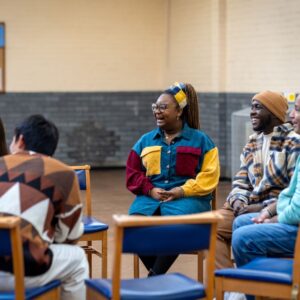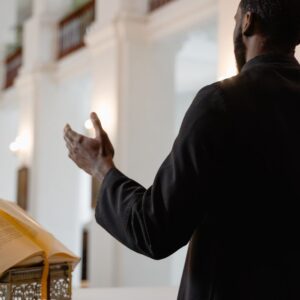This article is an excerpt from an interactive discussion with Organizational Psychologist and Executive Coach Dana Scannell, PhD and Dr. Rose Madrid Swetman, of the Center for Transforming Engagement. Dana and Rose share the challenges they hear as they do consulting work with teams, clergy, nonprofit leaders, and people that used to be leaders and are now deconstructing their faith.
Healthy conflict is essential to high-performing teams—but far too often, silence in meetings leads to sabotage at the water cooler.
In this powerful conversation between Rose and Dana, they explore how team dynamics, communication breakdowns, and unspoken disagreement can erode trust and hinder organizational alignment.
Dana highlights the crucial role leaders play in drawing out quieter voices, addressing internal tensions directly, and fostering psychological safety where people feel seen, heard, valued, and respected—even when they disagree.
From managing expectations to recognizing bias, this discussion underscores that leading through conflict means embracing discomfort, not avoiding it.
Teams thrive not when everyone agrees, but when every voice matters and decisions are honored once made. By building a culture of authentic engagement, leaders create environments where dissent can lead to better outcomes and where relational integrity is preserved, even under pressure.
Our work at the Center is to develop healthy, trustworthy teams and organizations to tackle your community’s most pressing problems. Learn more about our resilience training for leaders
Full Transcript:
ROSE: Dana, I wonder how you think about this. As an example, let’s you’re in a board meeting or in leadership team meeting, and you have to make a decision about something. And omebody’s silent, they don’t say anything. The team then makes the decision, and they walk out of the room, head to the water cooler and tell somebody in a different department, “oh my gosh, my team just made this terrible decision.” Because they were silent in the meeting, they didn’t get a chance to even say, “actually see a problem with this.”
One of the things that we talk about is – everybody’s voice needs to be heard. Once a decision this team makes, you might not agree, but you have to say, “I need to step off because I can’t go there with you guys”, or “I disagree, but I commit.” So I’m not gonna go out of this room and tell everybody else in the institution that I don’t agree with this decision. That’s part of being a good team member, would you say?
DANA: Oh, absolutely. But I think that the important part is, if that’s really what happened – they were silent, but then they went out to the water cooler, we missed a step as a leader. If we didn’t ask, “you’ve been kind of quiet, tell me more, tell me what you’re thinking.” So, I will take that one step of calling somebody out and some people are more comfortable speaking up, and some people aren’t gonna be speaking unless they’re asked.
So now I need to ask for a way for them to be able to feel comfortable saying, I don’t agree. But then we’ve got to have a commitment as leadership team or whatever, to be able to say, okay, we’re going to have to agree to disagree, but we’re going to lock arms and agree that this is the decision that the consensus made and that we’re not going to have a bunch of sour grapes going on. I’ve got that with the team I’m working with right now. I’ve got a couple of people who are just not happy, and they are going to do everything in their power to undermine the leader.
Guess what? First step, let’s have that conversation. Let’s call them out. Second step is, is this the right place, the right role for you? If you’re that passionate about the way we’re moving, what are the opportunities? Is this the right place for you? And it’s not a threat. Sometimes people take that as a threat. We’ll either get in line and shut up or toe the line or you’re gonna be out. No,
I wanna understand because maybe you’re the one who’s gonna say something and people go, oh my gosh, I never thought of that. Talk about unintended consequences. We would have made that decision and that would have been a bad decision. Or it was the right decision, and I now see it. I don’t like it, but I can get on board cause I trust you guys.
ROSE: It seems to me when we have that posture of everybody’s heard and one person they’ve agreed to disagree and I am committed, but I disagree. That feels cohesive to me. That feels right, rather than let’s have a big fight, and then go out and talk to other people in the institution about what happened in this meeting.
DANA: And also one last piece on that. What goes on in those kinds of meetings stays in the meetings. There is no leak. I have that premise with teams I work with and am on. I say, guys, if you have a challenge, you come to me and I’m happy to talk about it. Even if it’s something we’ve decided we need to revisit, I want to make sure that there’s no leak.
If there’s a leak that says we’re not connected in some way. It says we have a problem and we need to address that because otherwise we might as well leave the door open and let anyone who wants to come in. And that doesn’t lead to good leadership.
Question: In a high conflict situation, where it seems people are looking for a fight, what do you hope to achieve in the small time you may have?
DANA Yeah, Rome wasn’t built in a day and neither were the conflicts they have. I had a team leader that had an agenda, and he wanted me to come implement his agenda. He wanted me to tell these people what to do and how this is gonna be. I need somebody else to kind of back me up.
Nope, sorry. And he went hard at convincing me that I needed to do that. I said, we haven’t even started the engagement and I don’t think this is gonna work, I don’t think I’m the right person for you.
I also wanna manage expectations. I tell leaders that all the time that I am fresh out of magic wands, they’re on back order. And so for now, we’re gonna have to figure out how do we move forward together, and how do we also set and manage expectations of what we’re gonna do in this first phase.
A lot of times I’ll tell people, that we’re gonna start a bit of a pilot and we’re gonna try some things. And we’re gonna then figure out what works and what doesn’t work. Because everything that I’m gonna bring doesn’t necessarily work for what your experiences are, what your team is. So for me, the most important part is I get a high-performing team that’s struggling or has missed something.
The premise of teams is that people need to be able to listen well, disagree well, understand well, and hear each other well in conflict. We’re often in defense mode, and we’re not trying to think clearly. The Good Lord gave us two ears and one mouth, and we don’t always use them in proportion.
A lot of times that’s what you find. I know some of those statements are kind of cliche, but for the idea of high performing teams, we need to have a common purpose. We need to have clarity about what the goal is, and what the objectives are and what’s within our mission, what’s out of mission and what would be nice, but probably not gonna be right now. And to have enough psychological safety to establish trust with the team, with each other, to be able to have each other’s backs and know that we can have healthy conflict. We can engage in conversations in a way to be able to understand that more effectively.
DANA: The whole notion of coach bias or leader bias is something we just need to be mindful of. I can’t dispel it. I can’t walk in the door and not have my own experiences, my own biases. We talked about that at the beginning, but I have to be aware of that because I may have somebody that triggers me. Well, I’m gonna be horrible as a leader, not just a coach, but I’m gonna be terrible as a leader if I can’t at least acknowledge what is to myself and go, okay, that person really is kind of getting the better of you. Like, what are you gonna do with that? And often my word to myself is Jesus.
Jesus, help me to see this person for who you see him to be. Satan, you have no authority over this. Get out of here. I’m yours and I’m going to treat this person the way if you were sitting here at the table with us would want me to be treating them. And a lot of times it doesn’t, it’s not the magic bullet, but a lot of times it will help me. Just to level set myself.
ROSE: Thank you, Dana. One comment here is that the critical piece for this person, for someone truly being well while disagreeing, is whether they’re actually seen, heard, valued and respected in their reasons for disagreeing. Exactly. people have to know that they are actually were heard. It can’t be fake, like – we’ve already made the decision, but we’re going to hear everybody.
DANA: Yeah, I agree with that too. You emphasized actually seen, heard and valued and respected. Like I want to hear your opinion. I respect you and what you bring and whether we agree to disagree or not, it’s important that people feel like they’re actually heard and not just paid lip service.
Because we have to be able to hold each other’s tension, and we have to be okay with holding tension. And it’s not always, you know, is this fun? This rarely have I met a leader that’s like, oh boy-let’s have healthy conflict! The only leaders that I have worked with, and it’s fascinating to think about this, are people in like fire service, law enforcement, because they’re trained to run toward problems. But most of us in leadership positions, our bodies wanna run away from it. And then we hold it and then we stuff it and then it festers and then it turns into something we don’t want it to.










0 Comments